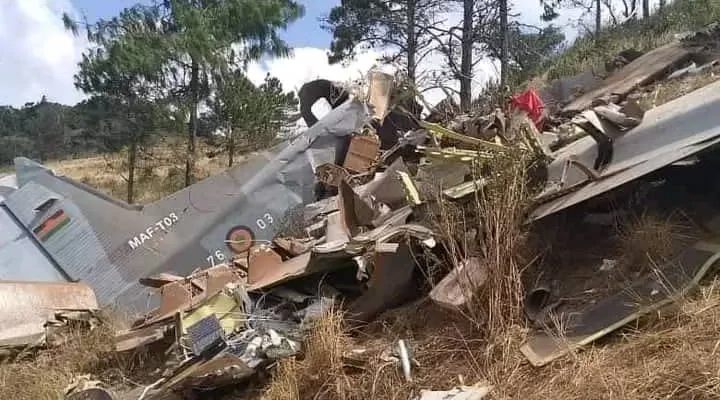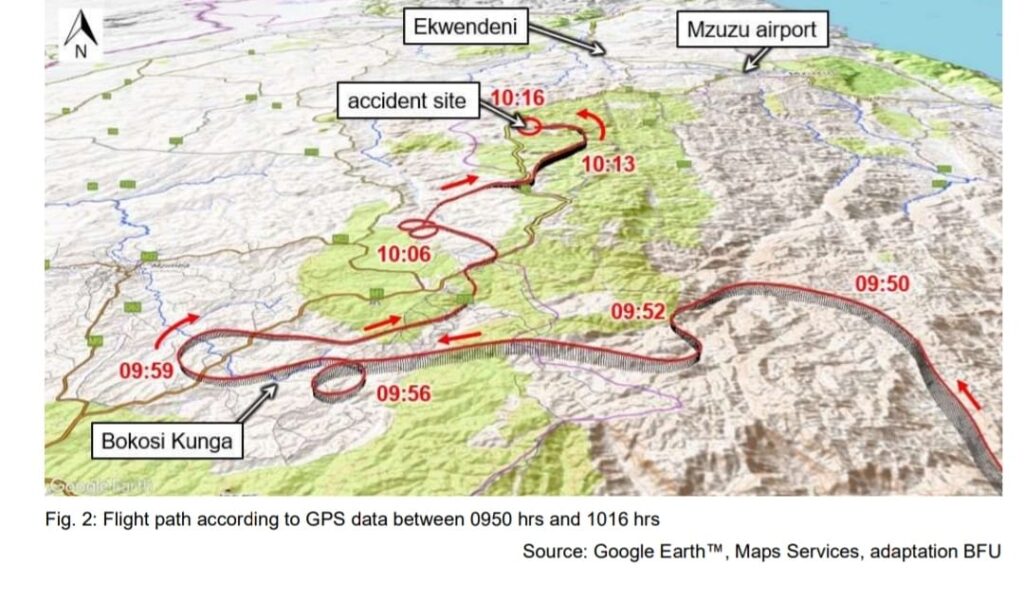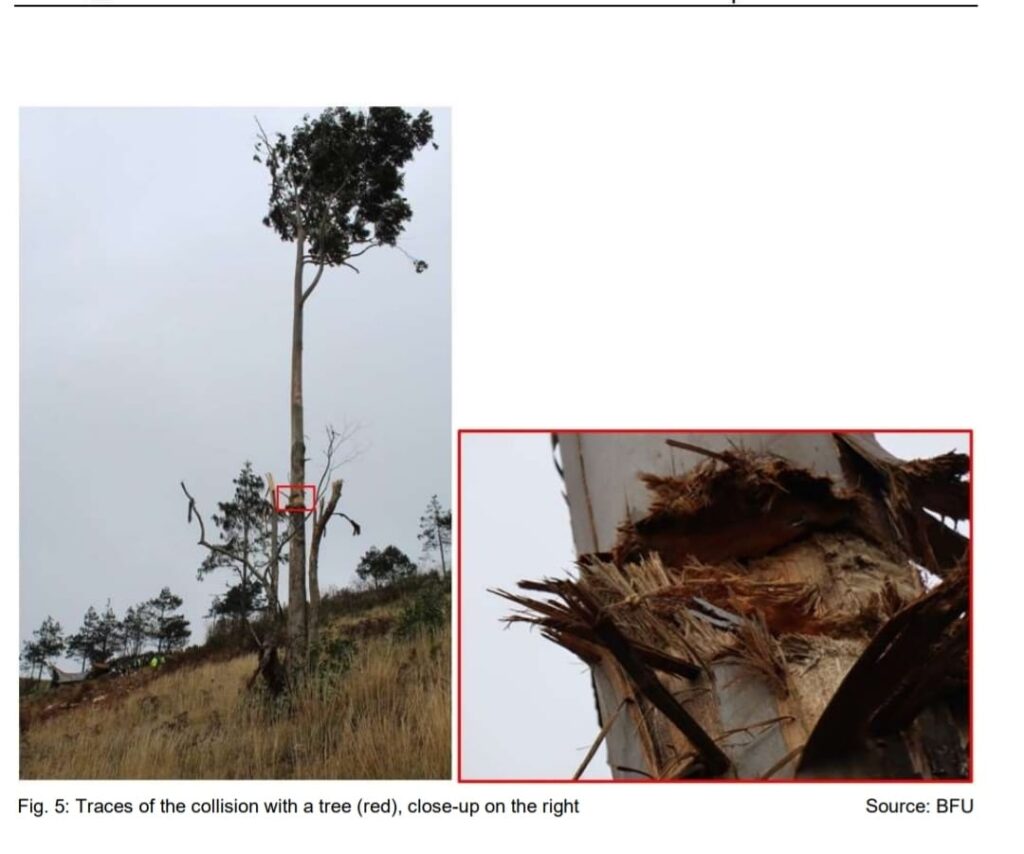The final investigative report into the June 10, 2024 plane crash that claimed the life of Malawi’s Vice President Dr. Saulos Klaus Chilima and eight others concludes that the accident was caused by a controlled flight into terrain (CFIT) under adverse weather conditions, compounded by poor decision-making, lack of situational awareness, and insufficient flight preparation by the crew.
The German Federal Bureau of Aircraft Accident Investigation (BFU), which led the investigation at the request of the Government of Malawi, released its findings today.
Families of the victims were briefed earlier in Lilongwe, and the Government of Malawi, through a press statement issued by Minister of Information Moses Kunkuyu, informed the public of the report’s publication on the BFU’s website.

The BFU determined that the military-operated Dornier 228-202(K), carrying Vice President Chilima and other officials from Lilongwe to Mzuzu, crashed into a hillside in Nthungwa Forest, Nkhata Bay District, after the flight crew continued under Visual Flight Rules (VFR) despite deteriorating weather that required Instrument Flight Rules (IFR).
The Pangolin Online engaged an aviation expert to simplify the technicalities in the report, and he explained that CFIT is when a fully functional aircraft is flown into the ground, mountain, or obstacle without the crew realizing it until it’s too late.
“In other words, the aircraft is under control but the pilots don’t know they’re on a collision course. CFIT can happen mainly due to poor visibility or weather, flying too low in mountainous terrain, lack of awareness of position known as situational awareness, distraction, stress, or fatigue, and inadequate use of warning systems,” he explained.
He said evidence on the ground and looking at the available flight protocols it was clear that in this crash the plane was flying too low to avoid clouds; the pilots entered instrument weather conditions (IMC) while still using VFR, and they lost situational awareness.
“The plane hit a hillside in Nthungwa Forest and this is a classic CFIT scenario,” he said.
The aviation expert further explained that VFR means the pilot flies the aircraft by sight, navigating by looking out the windows to see the terrain such as hills, buildings, trees; the horizon; other aircraft flying within the vicinity; and runways when landing.
To fly VFR safely and effectively, weather conditions must be clearenough to see the ground; avoid clouds; and maintain safe distances from obstacles. The expert explains that VFR is safe when visibility is good (usually 5+ km); clouds are high or scattered; of it is daytime with clear skies.
“When the weather turns bad such as low clouds, fog, rain, poor visibility, VFR becomes dangerous because a pilot may lose sight of terrain; they may not know if mountains or towers are ahead and it’s easier to become disoriented or misjudge altitude,” he explained.
He added: “You can fly straight into a hill or mountain without realizing it, especially in hilly areas like Mzuzu. In terrain like Mzuzu with such bad weather and to navigate safely through clouds or darkness, pilots switch to Instrument Flight Rules (IFR) which means using onboard instruments like altimeters, GPS, and radar.”

The BFU report indicates that contributing factors to the crash included:
- Decision to proceed at low altitude despite poor visibility, particularly in the hilly terrain south of Mzuzu.
- Failure to obtain a comprehensive meteorological briefing, relying only on a phone call to Mzuzu’s Flight Information Service, and ignoring mandatory preflight procedures.
- Inadequate use of terrain awareness systems, despite the aircraft being equipped with a Garmin Aera 760 with terrain alert features.
- Lack of radar coverage and absence of recorded ATC communications, which delayed search and rescue efforts by over 24 hours.
“The accident occurred because the crew flew into instrument meteorological conditions (IMC) during flight under VFR and the aircraft collided with the ascending terrain,” the report concluded.
According to the expert, IMC refers to weather conditions where pilots cannot safely fly just by looking out the window.
“In other words, the weather is too bad for Visual Flight Rules, and pilots must rely entirely on instruments inside the cockpit to navigate and control the aircraft,” he said.
Weather is considered IMC when it includes low visibility (usually less than 5 km); cloud ceilings too low (clouds too close to the ground); fog; heavy rain; dust storms; snow or thick haze; and flying inside clouds
In IMC, a pilot cannot see the terrain, other aircraft, or even the horizon, and must fly using tools like GPS; Altimeter (measures altitude); Artificial horizon (shows aircraft orientation); Airspeed indicator; and Compass or other navigation systems.
“If a pilot is flying under Visual Flight Rules but enters IMC, it’s like driving a car into thick fog with no headlights or road markings. Without instruments a pilot can become disoriented (not knowing which way is up); the plane can drift off course or fly too low; and there’s a serious risk of flying into terrain such as mountains, hills, towers,” explained the expert.
He added: “This is exactly what happened in the Malawi VP crash. The pilots flew into poor weather (IMC) while still using VFR, and without realizing it, collided with a hillside.”

In the wake of the accident, widespread public speculation ranged from mechanical failure to sabotage or foul play. The BFU report debunks these theories, establishing no evidence of:
- Technical malfunction: All instruments examined, including the Caution & Warning Panel, were found to be functioning before the crash. No warnings were active at the time of impact.
- Pilot incapacitation or foul play: Post-mortem reports found no evidence of pre-existing illness or toxicological factors.
- Sabotage: The aircraft was airworthy, with no anomalies in maintenance records, fuel quality, or security issues.
The report indicates that flight data retrieved from the aircraft’s Garmin system showed erratic altitude changes in the final 30 minutes. The aircraft repeatedly flew at dangerously low altitudes — in some cases less than 200 feet above ground — before ultimately crashing into a hill at 6,365 feet elevation.
“The aircraft impacted the slope of a hill… during a left-hand turn at approximately 283° heading,” the report stated.
According to the report, wreckage analysis confirmed that the landing gear was down, and the flaps were in position 1, suggesting the crew was attempting to land visually.
The report has this far exposed systemic weaknesses in Malawi’s aviation safety systems such as:
- Nonfunctional ELT (Emergency Locator Transmitter): Its battery had expired in 2004, and the aircraft lacked a modern 406 MHz ELT, rendering satellite detection impossible.
- Absence of radar or communication recording, a violation of ICAO Annex 11 safety protocols.
- Deficient meteorological coverage, as Malawi’s Department of Meteorological Services does not issue en-route forecasts, limiting pilots’ situational awareness.
The BFU has issued six recommendations among them:
- To Malawi’s Minister of Defence: Improve pilot training and adherence to flight rules.
- To the Minister of Transport: Upgrade civil aviation meteorological infrastructure.
- To Malawi Civil Aviation Authority and Malawi Air Force Commander: Enforce preflight weather briefings, implement mandatory use of terrain awareness systems, and ensure ELTs meet international standards.
In the press statement, the Government of Malawi acknowledged the report’s findings and confirmed its publication:
“The Government would like to inform the nation that BFU has published on its website this final investigative report into the plane crash where it can be accessed,” the statement reads.
Minister Kunkuyu reiterated the government’s commitment to transparency and to implementing reforms to prevent future tragedies.








